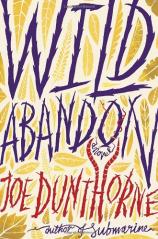Wild Abandon
Review
Wild Abandon
The word “commune” conjures images of hippies and cult leaders, drugged and radical, living on the very fringes of society. And that is why the characters at the center of Joe Dunthorne’s latest novel, WILD ABANDON, prefer the term “community.” Theirs is a community called Blaen-y-Llyn, a small farm in Wales. The community was founded almost accidentally by three college friends --- Don, Freya and Janet --- and their former landlord, Patrick. Over the years, many visitors and inhabitants have come and gone, and now the community has shrunk considerably. Besides dwindling numbers, the original members, as well as Don and Freya’s two children, are dealing with significant personal issues. WILD ABANDON follows them as they navigate their changing relationships and the fact that their original idealism has not made them as happy as they hoped they would be.
"WILD ABANDON is often funny and tender, and always enjoyable."
Freya has realized that her marriage to Don is over, and she no longer wants to live with him. Unable to totally break with the community right away, she moves into a half-finished cabin with her 11-year-old son, Albert. Albert, a bright but strange kid, has recently come under the influence of a new community member named Marina, who believes the end of the world is imminent. Part of Freya’s move is to get Albert away from the doomsday talk, but as Marina's young son Isaac is his only friend (and the only other child living at Blaen-y-Llyn), it proves to be difficult.
Meanwhile, Don and Freya’s teenage daughter Kate has run away. She leaves the community for the suburban home of her boyfriend. She longs for a normal life of college and new clothes, but mostly a life free from the oppressive atmosphere of her family’s life at the farm. Don, saddened by the break-up of his family, cannot see his responsibility in the situation and imagines that a revitalized community will solve all their problems. And Patrick, fueled by a hallucinogenic concoction, goes on a spree that lands him in the hospital where he is finally able to gain some clarity on his love for Janet, his animosity toward Don and his familial feelings for Albert and especially Kate.
While the apocalypse predicted by Marina may not come, Albert is right to be concerned because it seems his world, the only one he has ever known, is being destroyed. In the midst of the building emotional chaos, he and Kate will each have to make momentous decisions both about growing up and about being part of the community.
Most of the characters are realistically frustrating in their rigidity. Kate and Albert are well-conceived and interesting, and thus they steal the literary show here. They are coming of age on the margins and not doing as well as they seem to be at first glance. Both Kate and Albert are written with the right amount of tension and poignancy. Their responses to their kooky world and uncomfortable domestic situation are spot-on. The pace of the book is slow at times, though it does build to a nicely dramatic, if strange, conclusion. Dunthorne focuses on presenting the characters, their actions, thoughts and emotional motivations instead of lots of action.
WILD ABANDON is often funny and tender, and always enjoyable. Still, Dunthorne could've pushed things a bit further, and the novel could've been quite a bit funnier or, conversely, more serious and been better for it.
Reviewed by Sarah Rachel Egelman on March 8, 2012
Wild Abandon
- Publication Date: January 3, 2012
- Hardcover: 336 pages
- Publisher: Random House
- ISBN-10: 1400066840
- ISBN-13: 9781400066841




